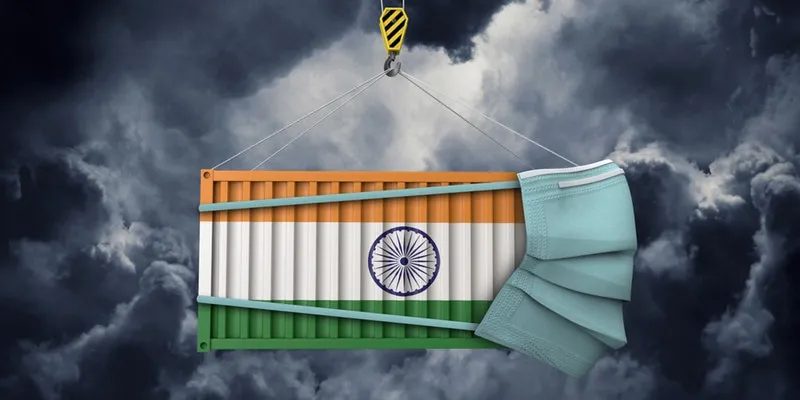Where is India’s manufacturing sector heading amid the coronavirus crisis?
India is witnessing a rise in coronavirus cases with over 400 cases reported so far. The virus is claiming lives, and has also shaken the economy, disrupting almost every sector, including the manufacturing industry that contributes about 15 percent to the GDP.
The coronavirus pandemic is one of the worst-ever disease outbreaks any country could think of. What surfaced in China in December 2019 has now become a global crisis affecting 184 countries with over three lakh confirmed cases and 14,000 deaths so far. And, this is not the end. The extent of the damage is unprecedented.
After China, Italy is the worst-hit with over 5,000 deaths so far. The government has imposed a national quarantine in the country and the entire nation is in a lockdown state.

Sailing through one of its worst times is India, where every day, new cases of coronavirus cases are being reported. The virus has not only affected human beings but has also shaken the economy, disrupting almost every industry and sector. It is difficult to estimate how the country will keep up the pace to be a five trillion economy by 2024.
One of the hardest-hit segments is the manufacturing sector which had not yet seen much slowdown. However, the coronavirus outbreak has made the entrepreneurs scared stiff.
Economic slowdown in China
According to CSIS report, China’s manufacturing and services sectors plunged to record lows in February, a month after the first death due to coronavirus. The automobile sales sank a record 80 percent, and China’s exports fell to 17.2 percent in January and February.
The official data confirmed a widespread slowdown in economic activity foreshadowed in low pollution levels and depressed shipping traffic, among other informal barometers. As Covid-19 spreads, China’s economic recovery will be challenged as demand from other countries drops as they cope with the virus.
Almost five million people lost their jobs after the Covid-19 outbreak.
India’s manufacturing sector faces threat
The first two months of the new year 2020 were critical for China when the country saw tremendous slowdown in its business.
The first case of coronavirus in India was confirmed in January 2020 that spiked panic in people and shook up the manufacturing sector which is dependent on procurement of raw materials from China.
By March 20, Indian Ministry of Health and Family Welfare confirmed a total of 236 confirmed cases of Covid-19 and four deaths.
Rules, obligations, and advisories are being issued by the government and each new advisory is impacting one industry or the other.
On March 19, the Federation of Indian Exports Organisations (FIEO) issued a press release stating that the micro, small, and medium enterprises (MSMEs) are likely to be worst-hit due to the coronavirus outbreak, particularly in the first quarter of FY 2020-2021.
The release said the export sector has started feeling the pinch with many requests from buyers to hold back shipments till further instructions and significant number of such requests may eventually lead to cancellation of orders.
According to FIEO, in cases where Indian exporters are adhering to the terms of contract, the force majeure clause is likely to be invoked by buyers to deny claim/liability raised by exporters.
With exporters hit hard and imports from many countries including China and Italy being halted, the manufacturing sector in India is likely to be worst affected.
Talking to SMBStory, Madhu Sudhan Bhageria, Chairman & MD, Filatex India Ltd says,
“Right now, everything looks alright but we don't know what will happen in the next couple of months. After the government’s decision to abolish anti-dumping duty on PTA, one of our key raw materials, the market was picking up. But due to Covid-19 scare, there are disruptions in the supply chain because of economic slowdown.”
Exporters want delay in shipment or even cancellations, Madhu says, adding, it would indirectly hit the business. People will not buy and that will set off a chain reaction. Like everywhere else in the world, it is a lockdown and retail sales are also not happening.
“We have supplies for the next one month, but if it continues, then production will be affected. We have to wait and watch as the next 15 days will be crucial.”
The entrepreneurs are worried whether the production will stop due to non-availability of raw materials and also due to impediments in the purchasing cycle.
Rahul Patel, Co-Founder, Jivika Naturals says,
“Business is likely to get impacted due to uncertainty, and also because of customers not stepping out to buy products. We are hoping that things will be better in the next few weeks and this situation comes under control soon as there is a slight decrease in the production and supply chain is also being affected.”
With its vast workforce and increasing adaptation to technology, India could have been an alternate manufacturing destination for many global companies after coronavirus hit China.
Ravi Saxena, Managing Director, Wonderchef Home Appliance Pvt Ltd says,
“There has been a global discussion about ‘CHINA PLUS ONE’ policy since a few years. It is basically to reduce dependence on Chinese imports and look towards another supplier nation that can compete with China. India could have been that option given its size and relative insulation from the impact of the virus. However, we need to get many things right, and quickly. Infrastructure, policy, and attitude of the private sector -- all three must come together for India to be able to leverage this opportunity.”
But, India’s dependence on procurement of raw materials from the country across sectors including automobile, electronic gadgets, pharma, and many more, created a slowdown in the Indian manufacturing units as well.
“We are in the business of air filtration and air quality and also sell masks. But the problem is that availability of all items is impacted due to supply chain issues originating in China. This will have a major impact to small businesses who must quickly pivot to control costs and manage the show over the next six months to ensure survival,” says Barun Aggarwal, Founder BreatheEasy.
Entrepreneurs are also scared about the drop in demand for products as Kiran Dham, CEO & HR Head, Globus Infocom says,
“The sudden outbreak of Covid-19 pandemic has created disruption in businesses globally. The main countries which have been major exporters or importers are at the epicentre of the epidemic, resulting in collapse of major industrial operations. Covid-19 outbreak has derailed the supply chain cycle across countries. Product manufacturing lead time has gone higher. We as manufacturers are also affected but since we work on a long-term inventory planning structure, we are better poised to face this crisis. This scenario will anyway cut the demand for the next three to six months.”
Alok Agarwal, Chief Marketing Officer, Orient Bell Tiles Ltd., also talks about the company's exports getting hit in the days to come. He says the company feels the brunt of covid-19 that has affected its 75 targeted districts.
As India’s manufacturing sector decelerates, Bala Parthasarathy, CEO and Co-founder, , says the economic impact is real and entrepreneurs should radically cut down their burn. While coronavirus hopefully may pass off in a few weeks or months, the sink will set in for the rest of 2020.
Kewal Kapoor, Director & Creative Strategist, CHAI kreative tells SMBStory that businesses are going to take a big hit from the pandemic as it is only going to make it difficult for them to keep their operations afloat. To avert a disaster, businesses should cut down on unnecessary costs.
Many manufacturers who have stocked up have switched their product sales to online, in order to mitigate offline sales, following social distancing to contain the spread of Covid-19.
(Edited by Javed Gaihlot)









